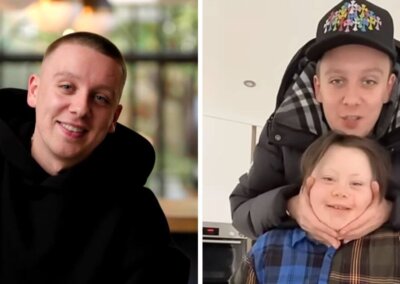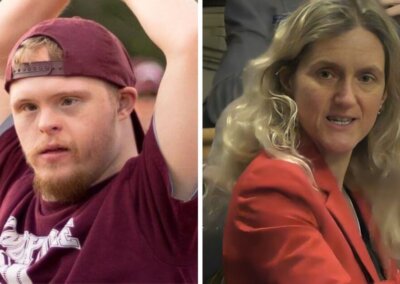Strictly Come Dancing has announced it will feature its first contestant with Down’s syndrome later this year.
Model and actress, Ellie Goldstein, 23, who will become the first person with Down’s syndrome to compete in the main series of Strictly Come Dancing, said “I’m absolutely over the moon to be joining the cast and pros of Strictly Come Dancing this year. It’s a show I’ve loved watching for so long, and the chance to now be part of it feels like a dream”.
“I know it’s going to be challenging, but I’m ready to do it with the glitter and glamour and make some magic on that dancefloor. Let the Strictly journey begin”.
Described as “a trailblazing model, actor and influencer”, Ellie made history in 2023 as the first model with Down’s syndrome to appear on the cover of British Vogue. She also partnered with Mattel to help launch its first ever Barbie with Down’s syndrome, which she said she “adored” because “it was great to finally see a doll that looked like me”.
Praise from charities for Ellie’s ability to “push boundaries”
The announcement has attracted significant attention, with Carol Boys, chief executive of the Down’s Syndrome Association, saying Ellie’s upcoming appearance on the show is “a wonderful recognition of her hard work”.
Boys also shared her hopes that it will help other people with Down’s syndrome. “It’s so important for other people who have Down’s syndrome, as well as the wider community, to see representatives in big shows like Strictly”.
Jon Sparkes OBE, Chief Executive of learning disability charity Mencap, praised Ellie for her ability to “push boundaries”. “Ellie has never been afraid to push boundaries, and this is just another way to show what people with a learning disability can achieve with the right support”, he said.
“It shouldn’t be unusual to see someone with a learning disability sharing their talents and we hope this prompts more shows to include them”.
Ellie’s parents only discovered she had Down’s syndrome after she was born. The doctors said she would never walk or talk, and, according to Yvonne, Ellie’s mother, and a nurse suggested they might want to leave Ellie at the hospital.
However, the doctors were wrong. Ellie could walk by 18 months, was speaking by her third birthday and was able to read by the time she started school.
Pressure on parents of children with Down’s syndrome to abort their unborn baby
While many people are excited about Ellie’s appearance on Strictly Come Dancing, parents of children with Down’s syndrome often feel pressure to abort, often by medical professionals themselves.
In October 2024, Welsh mother Kat Booker said she felt “pushed towards termination” when she was pregnant with her daughter Nancy, who has Down’s syndrome.
Booker said “I felt like I was being pushed towards termination, because it was the easier thing to do”.
“I was just being told how difficult everything was going to be and all the things that Nancy quite possibly wouldn’t do, but not being given any other information as in there are children living quite happily with Down’s syndrome”.
Laura Howard shared similar concerns, saying that being given the diagnosis of Down’s syndrome for her son Tomos was “very much like a bereavement situation”. Howard added “We had a nurse coming in and being quite upset, saying ‘oh, you’re too nice a people to have this happen to you’. It’s from good intentions that they’re trying to say that, but it is still creating this whole negative situation around what is just a baby first and foremost”.
Spokesperson for Right To Life UK, Catherine Robinson, said “Hopefully, Ellie’s appearance on Strictly Come Dancing will provide encouragement for other people with Down’s syndrome. It is wonderful that this story has received such widespread and positive coverage”.
“Ellie’s appearance highlights growing mainstream awareness about the potential of people with Down’s syndrome to lead fulfilling and meaningful lives. We hope hearts and minds will be changed, so that people can appreciate how unjust it is to abort children with Down’s syndrome before they have a chance to live outside of the womb”.












